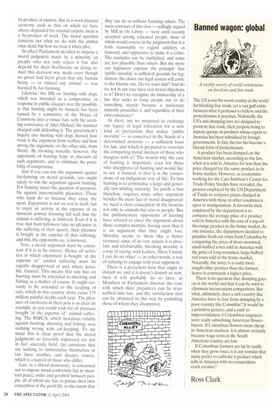Banned wagon: global
A weekly survey of world restrictions on freedom and free trade
The US is not the worst country in the world for blocking free trade, yet a vast gulf exists between what it professes to believe and the protectionism it practises. Notionally, the US's anti-dumping laws are designed to promote free trade, their purpose being to impose quotas on products whose export to America has been subsidised by foreign governments. In fact, the law has become a blatant form of protectionism.
A product has been dumped on the American market, according to the law, when it is sold in America for less than the price charged for the same product in its home market. However, as economists working for the Cato Institute's Center for Trade Policy Studies have revealed, the process employed by the US Department of Trade to compare prices charged in America with those in other countries is open to manipulation. A favourite trick employed by the department is to compare the average price of a product sold in America with the cost of a top-ofthe-range product in the home market. In one instance, the department decided to penalise fresh-cut roses from Colombia by comparing the price of short-stemmed, small-bulbed roses sold in America with the price of long-stemmed, large-bulbed red roses sold in the home market. Naturally, the latter is a vastly more sought-after product than the former; hence it commands a higher price.
There is no question that dumping goes on in the world and that it can be used to eliminate inconvenient competitors. But what, ultimately, does a rich country like America have to fear from dumping by a poor country like Colombia? It would be a pointless gesture, and a path to impoverishment if Colombian taxpayers were really subsidising American flowerbuyers. If Colombian flowers seem cheap in American markets, it is almost certainly because wage costs in the South American country are low.
If Colombian farmers are hit by tariffs when they grow roses, is it any wonder that many prefer to cultivate a product which sells in America with no competition: crack cocaine?
Ross Clark


































































 Previous page
Previous page